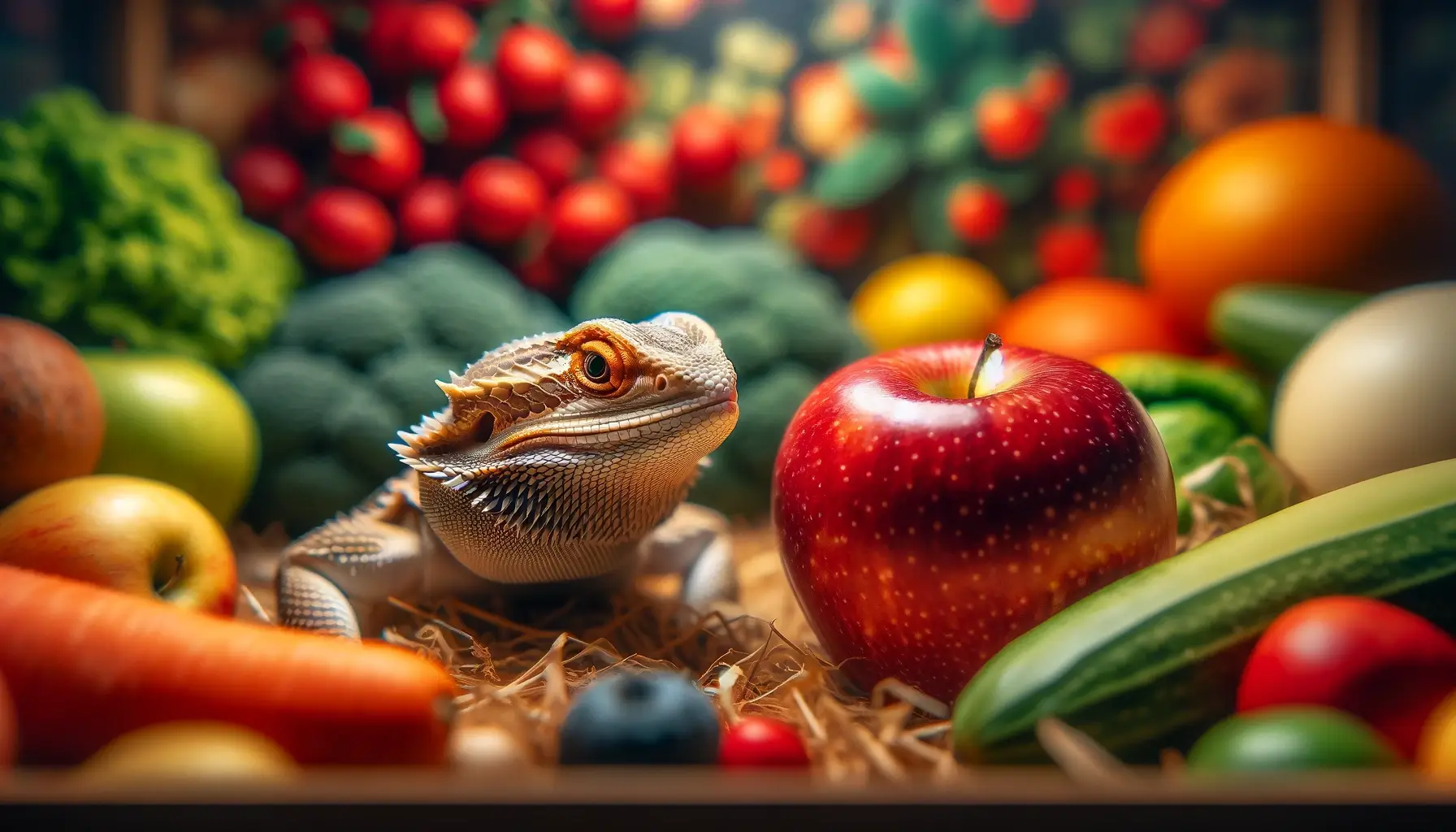Navigating the landscape of your bearded dragon can be as puzzling as a Rubik’s cube. You’re probably wondering if apples, a common fruit in many households, can make their way into your pet’s diet. Well, it’s not a simple ‘yes’ or ‘no.’ There are several factors you need to consider before you let your scaly friend chomp down on this juicy treat. From nutritional benefits to preparation methods, it’s a winding road of information you’ll want to explore, especially if you’re keen on providing the best care for your pet. Stay with me, and let’s unravel this together.
Key Takeaways
- Bearded dragons can eat apples, but they should not make up a large part of their diet to avoid obesity and health problems.
- Granny Smith apples are a good source of Vitamin C, while red apples are rich in antioxidants.
- Overfeeding apples can lead to nutritional imbalances, digestive issues, and obesity due to their high sugar content.
- Risks associated with apples, such as impaction and metabolic bone diseases, can be prevented by limiting apple intake, balancing the diet with calcium-rich food, and peeling apples before feeding.
Understanding Bearded Dragon’s Diet
Before diving into the specifics of whether bearded dragons can consume apples, it’s key to grasp a solid understanding of their overall diet. Bearded dragons are omnivorous, meaning they eat both plant and animal matter. This includes a variety of fruits, vegetables, insects, and occasionally small rodents.
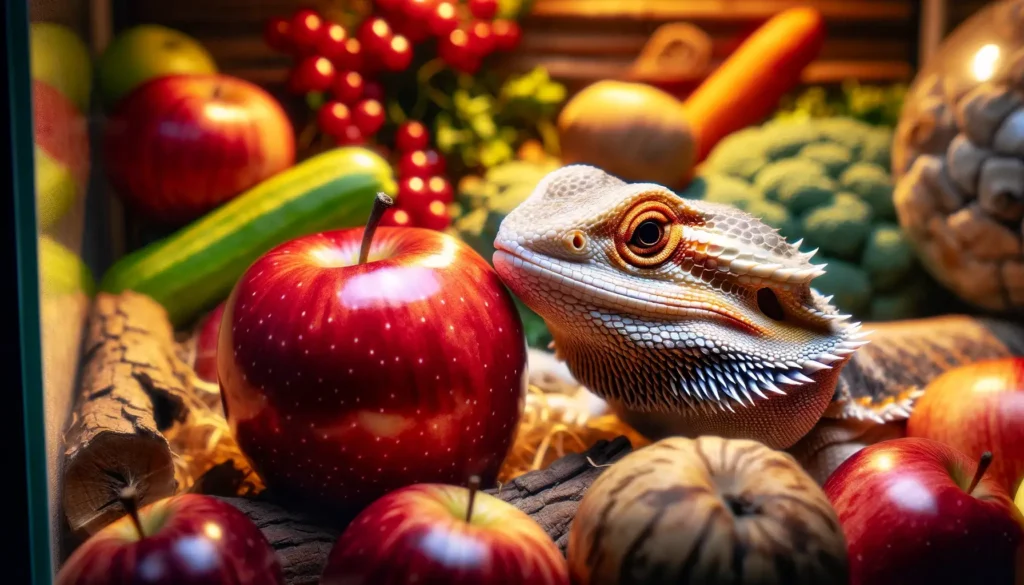
Now, you might be wondering, “Can bearded dragons eat green apples?” or “Can baby bearded dragons eat apples?” The answer to both is yes. Green apples, along with other varieties, are safe for bearded dragons to consume. However, it’s essential to remove the seeds as they contain cyanide, which is harmful to these creatures.
But can bearded dragons eat apples every day? No. Despite apples being safe, they shouldn’t make up a large part of a bearded dragon’s diet. Too much fruit can lead to obesity and other health problems.
Nutritional Benefits of Apples
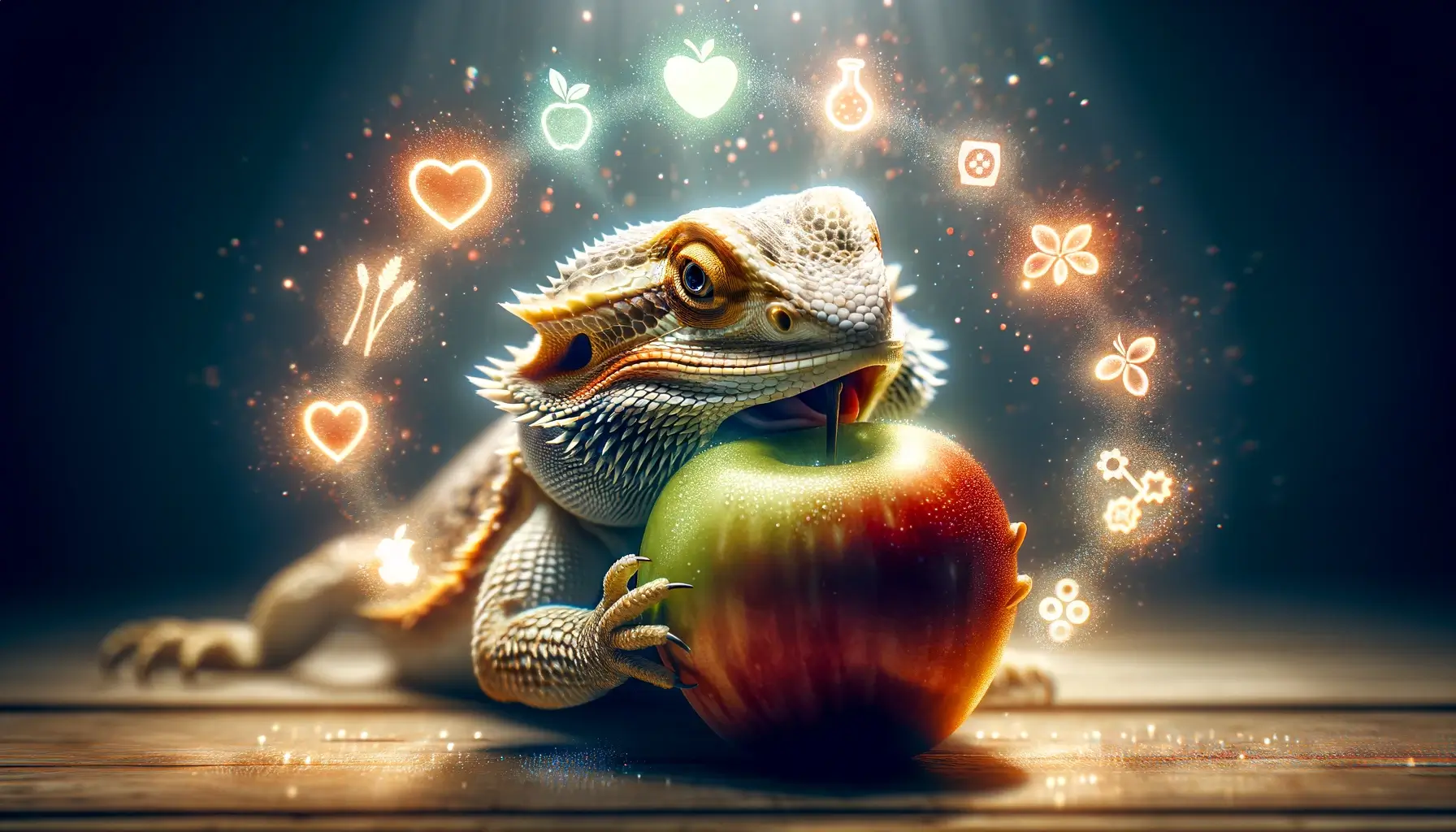
While apples should not make up a large part of a bearded dragon’s diet, they do provide some nutritional benefits when consumed in moderation. Apples are rich in essential nutrients and can offer variety in your pet’s diet. If you’re wondering, “can bearded dragons eat apples?” the answer is yes, but with precautions.
- Can bearded dragons eat Granny Smith apples? Yes, they can, and these apples are an excellent source of Vitamin C.
- Can bearded dragons eat apples with skin? Yes, but make sure they are washed thoroughly to remove any pesticides.
- Can bearded dragons eat red apples? Absolutely! Red apples are rich in antioxidants.
- Can bearded dragons eat crab apples? Only if they are ripe and small in size.
Potential Risks of Feeding Apples
Despite the nutritional benefits of apples for bearded dragons, it’s crucial to consider the potential risks associated with feeding them this fruit. Primarily, you need to question, ‘how often can bearded dragons eat apples?’ Overfeeding apples could lead to nutritional imbalances, digestive issues, and obesity.
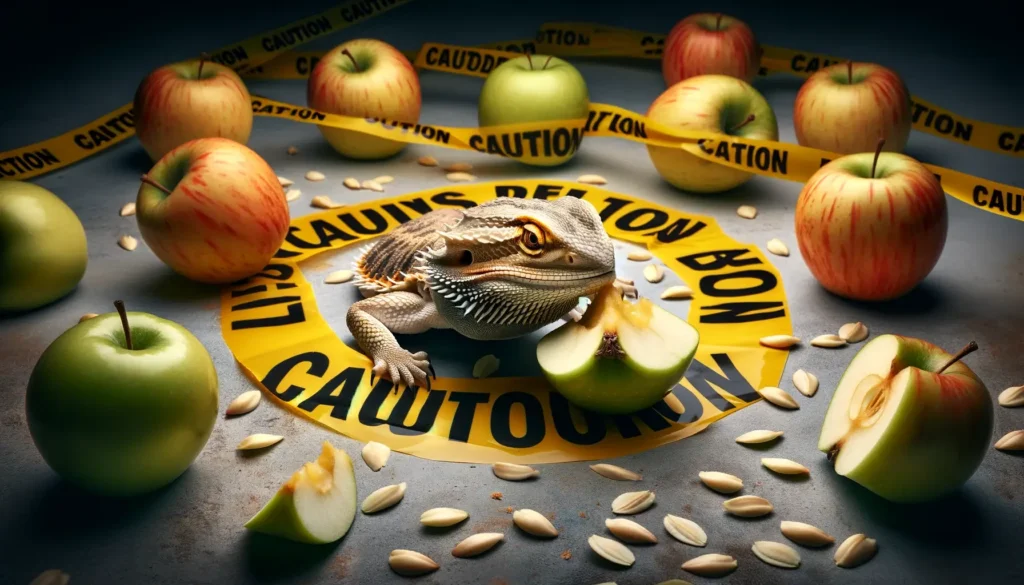
Apples are high in sugar, which can lead to obesity if fed in excess. They also contain oxalates, which can bind with calcium in your dragon’s body, leading to metabolic bone diseases. Furthermore, the hard skin of apples can be challenging for your pet to digest, increasing the risk of impaction.
To help you understand, let’s view a table summarizing the potential risks:
| Potential Risk | Cause | Prevention |
|---|---|---|
| Obesity | High sugar content | Limit apple intake |
| Metabolic Bone Disease | Oxalates | Balance diet with calcium-rich food |
| Impaction | Hard apple skin | Peel apples before feeding |
Preparing Apples for Your Dragon
Getting apples ready for your bearded dragon isn’t a complex task, but it does require attention to detail to ensure their safety and health. The first step is choosing the right apple. Organic, pesticide-free apples are the safest and most beneficial for your pet.
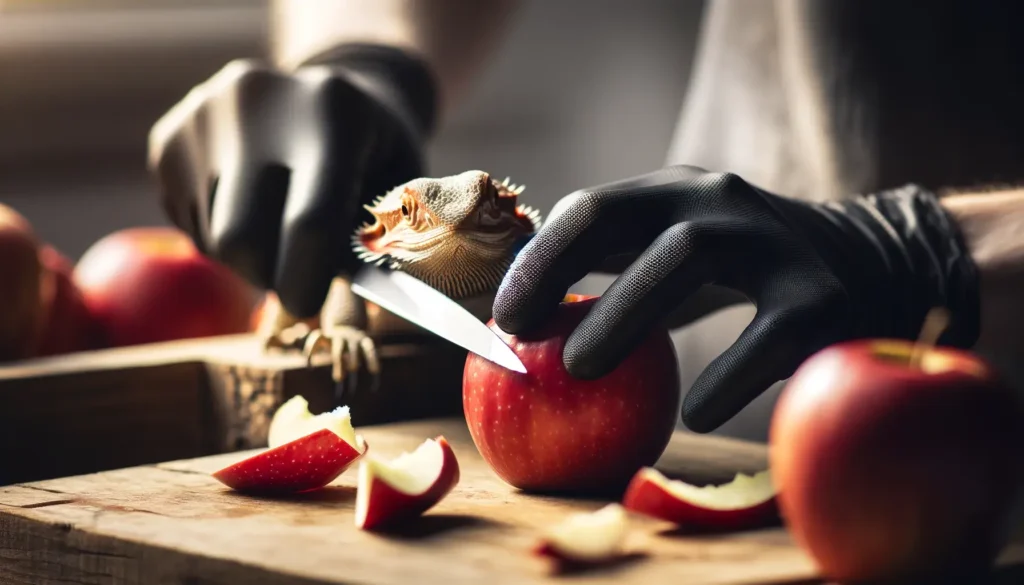
Here are the steps to make apples ready for your dragon:
Wash the Apple: Always wash the apple thoroughly under running water to remove any potential pesticides or harmful substances.
Peel and Core the Apple: The skin of the apple may be difficult for your dragon to digest. Moreover, the core and seeds contain cyanide which is toxic for the dragon.
Cut into Small Pieces: Chop the apple into small, manageable pieces that your bearded dragon can easily consume. Large pieces can cause choking hazards.
Serve Moderately: Remember, apples should only be a small part of your dragon’s diet due to their high sugar content.
Careful preparation ensures that your bearded dragon can enjoy a tasty, healthy treat without risk. This approach gives you the freedom to provide diverse, engaging meals for your pet, contributing to their overall happiness and wellbeing.
Frequency of Feeding Apples
After preparing apples properly for your bearded dragon, it’s essential also to consider how often these sweet treats should be included in their diet. Apples, while nutritious, should not make up a significant portion of your dragon’s diet.
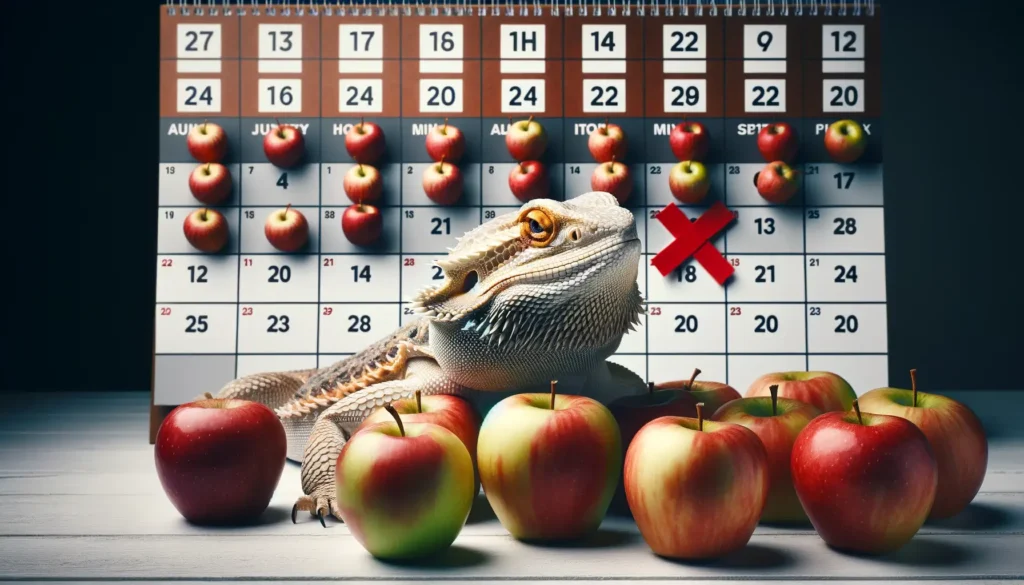
Given their high sugar content, too many apples can lead to health issues such as obesity, digestive problems, and even tooth decay. Instead, consider them a treat and feed them to your pet sparingly.
Here is a recommended schedule:
Age of DragonFrequencyQuantity
- Baby (1-4 months) Once a month 1 small piece
- Juvenile (5-10 months) Twice a month 1-2 small pieces
- Adult (11+ months) Once a week, 2-3 small pieces
This table offers a general guideline for feeding apples to your dragon. Remember, every dragon is unique. Monitor your pet’s reaction and adjust the feeding schedule as needed. While we all enjoy the freedom to eat what we want, when we want, it’s crucial to prioritize our pets’ health and well-being over their immediate gratification. After all, a healthy dragon is a happy dragon.
Apples and Baby Bearded Dragons
When it comes to baby bearded dragons, you need to be extra cautious about their apple consumption, considering their delicate digestive systems and nutritional needs. Unlike their adult counterparts, babies have a smaller stomach capacity and are still developing their digestive abilities. This makes apples, which are high in fiber and acidity, a potential risk if not administered in the right way and quantity.
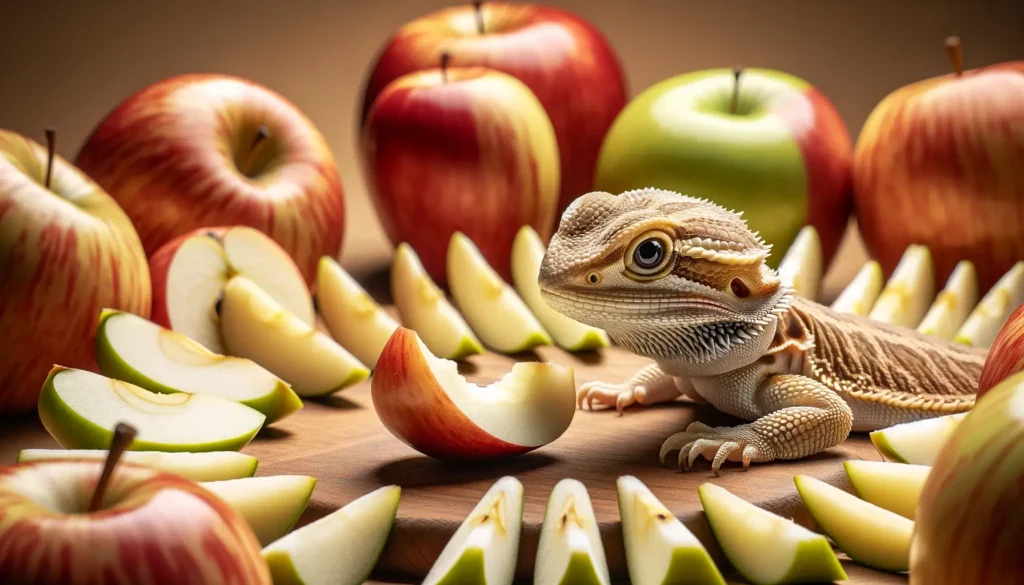
Consider these essential points before offering apples to your juvenile bearded dragon:
- Always peel the apples: Baby bearded dragons can’t digest apple skins due to their high fiber content.
- Cut into tiny pieces: Apples should be diced into bites that are easy for the baby to swallow and digest.
- Feed apples sparingly: Given the high acidity, apples should only make up a minor part of the baby’s diet.
- Monitor after feeding: Watch for signs of discomfort, which may indicate that the apple isn’t being digested properly.
While apples can provide some beneficial nutrients for your baby bearded dragon, they should be given as a treat rather than a staple. Tailoring the diet to their specific needs will ensure their optimal health and freedom to grow.
Different Types of Apples
Now that you understand how to feed apples to your baby bearded dragon safely let’s explore the different types of apples and how their nutritional content may vary.
Apples come in a wide variety of types, each with its unique taste, texture, and nutritional profile. The most common ones include ‘Red Delicious,’ ‘Golden Delicious,’ ‘Granny Smith,’ and ‘Fuji.’
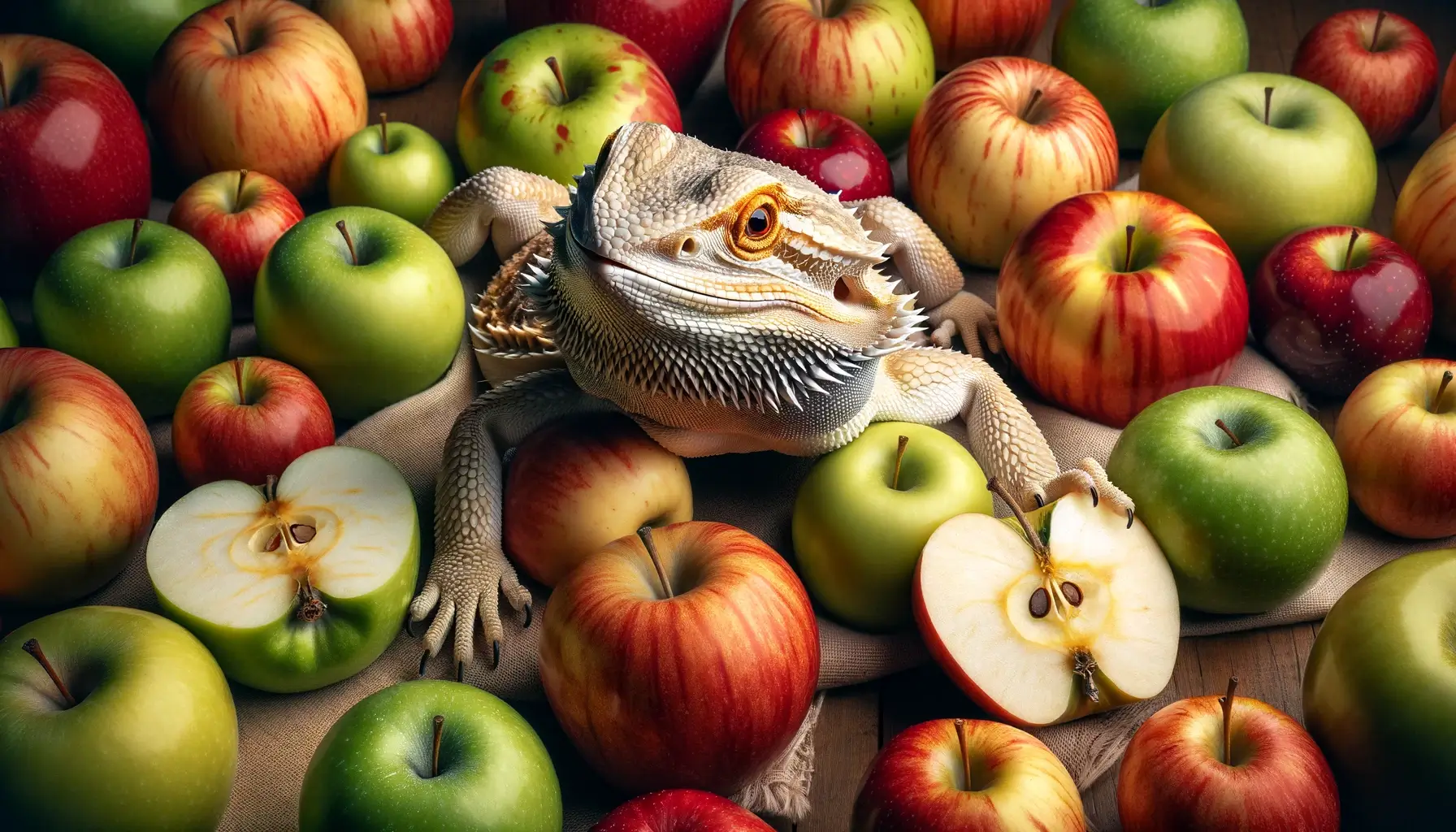
Here’s a quick comparison of these four apple types:
Type of Apple Nutritional Quality:
- Red Delicious Rich in antioxidants
- Golden Delicious High fiber content
- Granny Smith Low in sugar, high in fiber
- Fuji High in vitamins and fiber
Red Delicious apples are known for their high antioxidant content, which can boost your dragon’s immune system. Golden Delicious, on the other hand, is high in fiber. Granny Smith apples are lower in sugar, which makes them a healthy choice for your pet. Lastly, Fuji apples are known for their high vitamin and fiber content.
Choosing the right type of apple can make a big difference in your pet’s health. So, take your pick wisely, ensuring that it’s not just tasty but also nutritious for your bearded dragon.
Case Study: Bearded Dragons and Apples
In examining the relationship between bearded dragons and apples, it’s crucial to consider various factors such as their dietary needs, the type of apple, and the frequency of feeding. Bearded dragons are omnivorous, enjoying both plant-based and meat-based food. However, the type of apple can affect their digestion. For instance, green apples are highly acidic and can cause stomach upset.
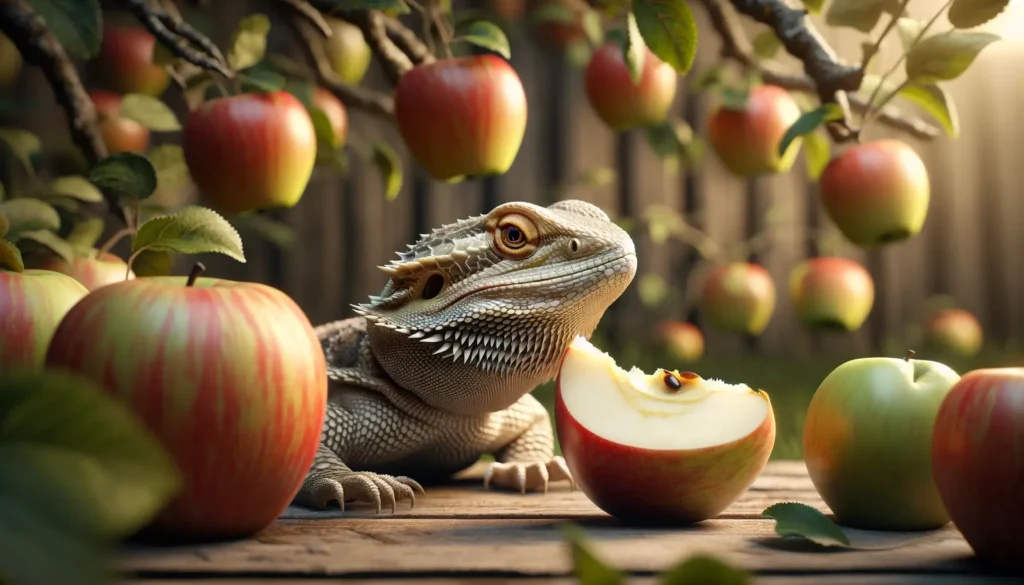
Also, moderation is key. Remember, apples should be a treat, not a staple in their diet. Overfeeding can lead to health issues such as obesity and nutrient imbalance.
To add depth to this discussion, here are some critical points to remember:
- Always peel and core the apple before feeding it to your bearded dragon.
- Cut the apple into small, manageable pieces to prevent choking.
- Monitor your bearded dragon’s reaction after eating apples. If you notice any signs of discomfort or distress, it’s best to stop feeding them apples.
- Diversify their diet with other fruits and vegetables, not just apples.

